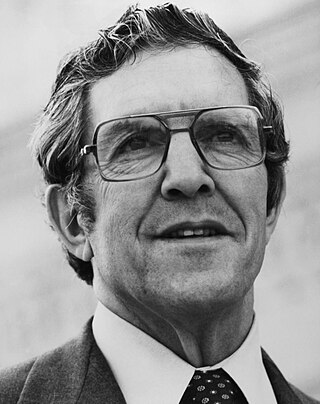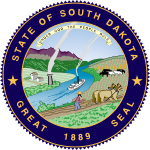
Karl Earl Mundt was an American educator and a Republican member of the United States Congress, representing South Dakota in the United States House of Representatives (1939–1948) and in the United States Senate (1948–1973).

Ellis James Abdnor was an American politician who served as a member of the United States Senate from South Dakota. He was also the 15th Administrator of the Small Business Administration under presidents Ronald Reagan and George H. W. Bush.

The 1976 United States Senate elections was an election for the United States Senate. Held on November 2, the 33 seats of Class 1 were contested in regular elections. They coincided with Democrat Jimmy Carter's presidential election and the United States Bicentennial celebration. Although almost half of the seats decided in this election changed parties, Carter's narrow victory did not provide coattails for the Democratic Party. Each party flipped seven Senate seats, although, one of the seats flipped by Democrats was previously held by a Conservative.

The 1972 United States Senate elections were held on November 7, with the 33 seats of Class 2 contested in regular elections. They coincided with the landslide re-election of Republican President Richard Nixon. Despite Nixon's landslide victory, Democrats increased their majority by two seats. The Democrats picked up open seats in Kentucky and South Dakota, and defeated four incumbent senators: Gordon Allott of Colorado, J. Caleb Boggs of Delaware, Jack Miller of Iowa, and Margaret Chase Smith of Maine. The Republicans picked up open seats in New Mexico, North Carolina, and Oklahoma, and defeated one incumbent, William B. Spong Jr. of Virginia.

The 2004 United States presidential election in South Dakota took place on November 2, 2004, and was part of the 2004 United States presidential election. Voters chose three representatives, or electors to the Electoral College, who voted for president and vice president.

George McGovern, a Democratic Party politician from South Dakota, was first elected to the United States House of Representatives to represent South Dakota's 1st congressional district in 1956. He was re-elected in 1958, before making an unsuccessful run for the United States Senate in 1960 against Republican incumbent Karl Earl Mundt. After serving in the John F. Kennedy administration as director of the Food for Peace program, McGovern ran again for the Senate and narrowly prevailed over appointed Senator Joseph H. Bottum. In 1968, McGovern unsuccessfully sought the Democratic Party's presidential nomination at the Democratic National Convention and was re-elected to the Senate over former Governor of South Dakota Archie M. Gubbrud. In 1972, McGovern was successful in his campaign for the Democratic presidential nomination, but lost the election in a landslide to incumbent President Richard Nixon. McGovern was re-elected to the Senate in 1974 over Vietnam War veteran Leo K. Thorsness, but lost re-election in 1980 to then-U.S. Representative James Abdnor. McGovern made a final unsuccessful run for president in 1984 United States presidential election.

The 1948 United States Senate election in South Dakota took place on November 2, 1948. Incumbent Republican Senator Harlan J. Bushfield, suffering from poor health, declined to run for re-election. On September 27, 1948, he died in office; his wife, Vera C. Bushfield, was appointed to succeed him. Congressman Karl E. Mundt easily won the Republican primary and advanced to the general election, where he was opposed by Democratic nominee John A. Engel, an attorney. Hundt defeated Engel in a landslide.

The 1968 United States Senate election in Kansas took place on November 5, 1968, concurrently with the U.S. presidential election as well as other elections to the United States Senate in other states as well as elections to the United States House of Representatives and various state and local elections.

The 1954 United States Senate special election in California was held on November 2, 1954, to elect a U.S. Senator to complete the unexpired term of Senator Richard Nixon, who resigned on becoming Vice President of the United States following the 1952 presidential election. Incumbent Republican U.S. Senator Thomas Kuchel, who had been appointed by Governor Earl Warren, won election to the remainder of the term, defeating Democratic nominee Sam Yorty.

The 1962 United States Senate election in Washington was held on November 6, 1962. Incumbent Democratic U.S. Senator Warren Magnuson won a fourth term in office, narrowly defeating Republican nominee Richard G. Christensen.

The 1966 United States Senate election in Kansas took place on November 8, 1966, concurrently with elections to the United States Senate in other states as well as elections to the United States House of Representatives and various state and local elections.

The 1972 United States Senate election in Oregon took place on November 7, 1972. Incumbent Republican Senator Mark Hatfield was re-elected to a second term in office, defeating Democrat Wayne Morse.

The 1966 United States Senate election in South Dakota took place on November 8, 1966. Incumbent Republican Senator Karl E. Mundt ran for re-election to his fourth term. He was challenged in the Republican primary by a John Birch Society member, but easily turned away the challenge. In the general election, he faced State Representative Donn Wright, the Democratic nominee. Owing in large part to the Republican landslide taking place nationwide, Mundt defeated Wright by an unprecedented margin.

The 1972 United States Senate election in Kansas took place on November 7, 1972, concurrently with the U.S. presidential election as well as other elections to the United States Senate in other states as well as elections to the United States House of Representatives and various state and local elections.

The 1972 United States Senate election in New Hampshire took place on November 7, 1972. Incumbent Democratic Senator Thomas J. McIntyre won re-election to a third term. Democrats would not win this seat again until 2008. This was the first time Democrats were re-elected to any Senate seat in New Hampshire.

The 1974 United States Senate election in South Dakota was held on November 5, 1974. Incumbent Democratic U.S. Senator George McGovern, who had lost the 1972 United States presidential election to Richard Nixon ran for reelection to a third term and won, despite having also lost his home state two years prior.

The 1978 United States Senate election in South Dakota was held on November 7, 1978. Incumbent Democratic U.S. Senator James Abourezk did not run for re-election to a second term, but was succeeded by his political rival, Republican U.S. Representative Larry Pressler.

The 1970 South Dakota gubernatorial election was held on November 3, 1970. Primary elections were held on June 2, 1970. Incumbent Republican Governor Frank Farrar was defeated by Democratic nominee Richard F. Kneip who won 54.85% of the vote.

The 1964 South Dakota gubernatorial election was held on November 3, 1964.

The 1914 South Dakota gubernatorial election was held on November 3, 1914. Despite a close election in 1912, incumbent Republican governor Frank M. Byrne defeated Democratic nominee James W. McCarter, an Edmunds County Judge, with 50.07% of the vote. Coincidently, Bryne's Democratic opponent in 1912, Edwin S. Johnson, was elected the same year to represent South Dakota in the United States Senate.























